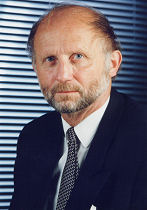Achim Müller (1938 - 2024)#
Obituary by Michel Verdaguer MAE, Pierre Gouzerh and Anna Proust#
Our community mourns the loss of Prof. Dr. Dr. h. c. mult. Achim Müller MAE. He passed away on February 28, 2024, at the age of 86. He was not only an exceptionally creative chemist but also a man of broad scientific and philosophical culture. Prof. Müller was member of the Chemical Sciences section of Academia Europaea since 1998.
Achim Müller was born in Detmold, Germany. He studied chemistry and theoretical physics at Göttingen University
 where he obtained his doctorate in 1965 on a topic in thermochemistry, and his habilitation in 1967 on a topic in vibrational spectroscopy. In 1971, he was appointed Associate Professor at the University of Dortmund
where he obtained his doctorate in 1965 on a topic in thermochemistry, and his habilitation in 1967 on a topic in vibrational spectroscopy. In 1971, he was appointed Associate Professor at the University of Dortmund . In 1977, he became full Professor of Inorganic chemistry at the University of Bielefeld
. In 1977, he became full Professor of Inorganic chemistry at the University of Bielefeld where he spent his career and where he continued to be very active long after his retirement in 2003.
where he spent his career and where he continued to be very active long after his retirement in 2003.
Researches conducted by Prof. Müller span a broad range of areas reflecting his great inclination for interdisciplinary approaches. He is especially renowned for his work relating to the understanding and control of the formation of large and complex molecular systems from simpler components. In the specific field of polyoxometalate chemistry, he and his team thus succeeded in preparing and characterizing a lot of remarkable molecular systems who have continued to amaze the whole community by their dimension, their aesthetics and the scope of their potential applications. The most famous of them are the wheel-shaped molecular-oxide-based clusters (e.g. the {Mo154} “Bielefeld Ferris wheel”) and the porous spherical metal-oxide-based capsules (e.g. the {Mo132} Keplerate). Such results have dramatically pushed the limits in the field of metal oxide clusters.
These outstanding achievements were recognized by the scientific communities by his election to several German and Foreign Academies, distinguished by international prestigious Prizes and honored by honoris causa universities’ doctorates.



